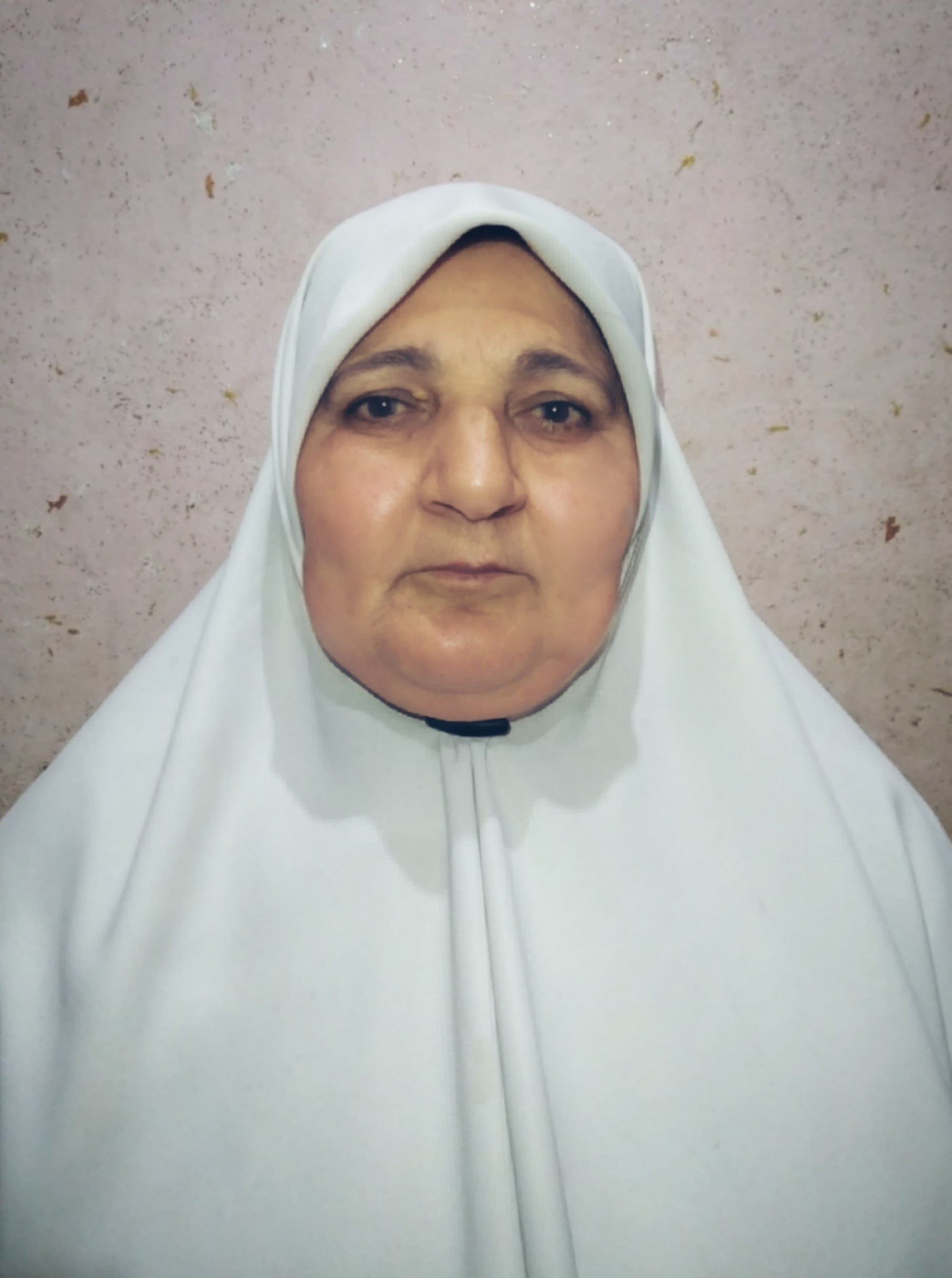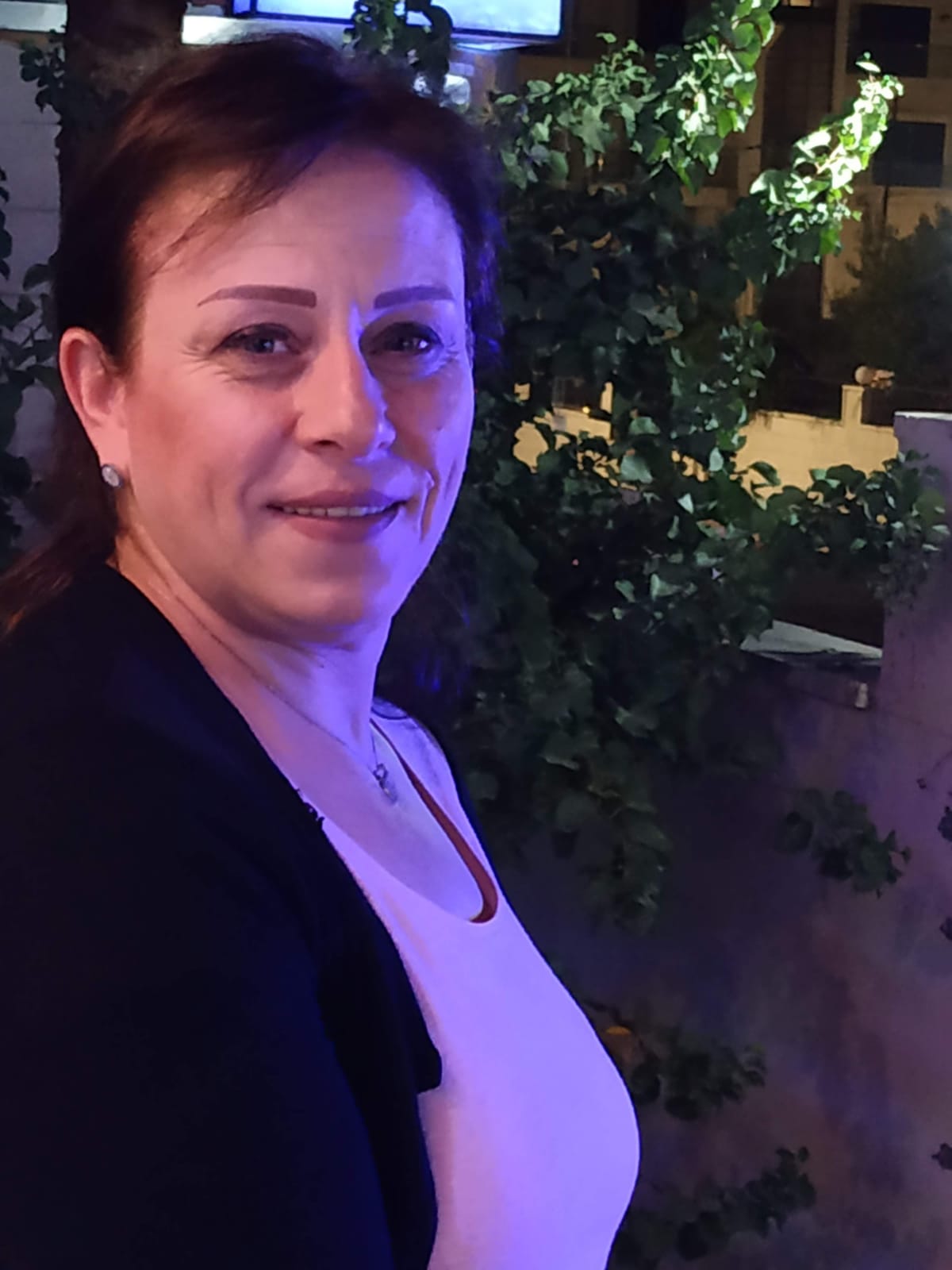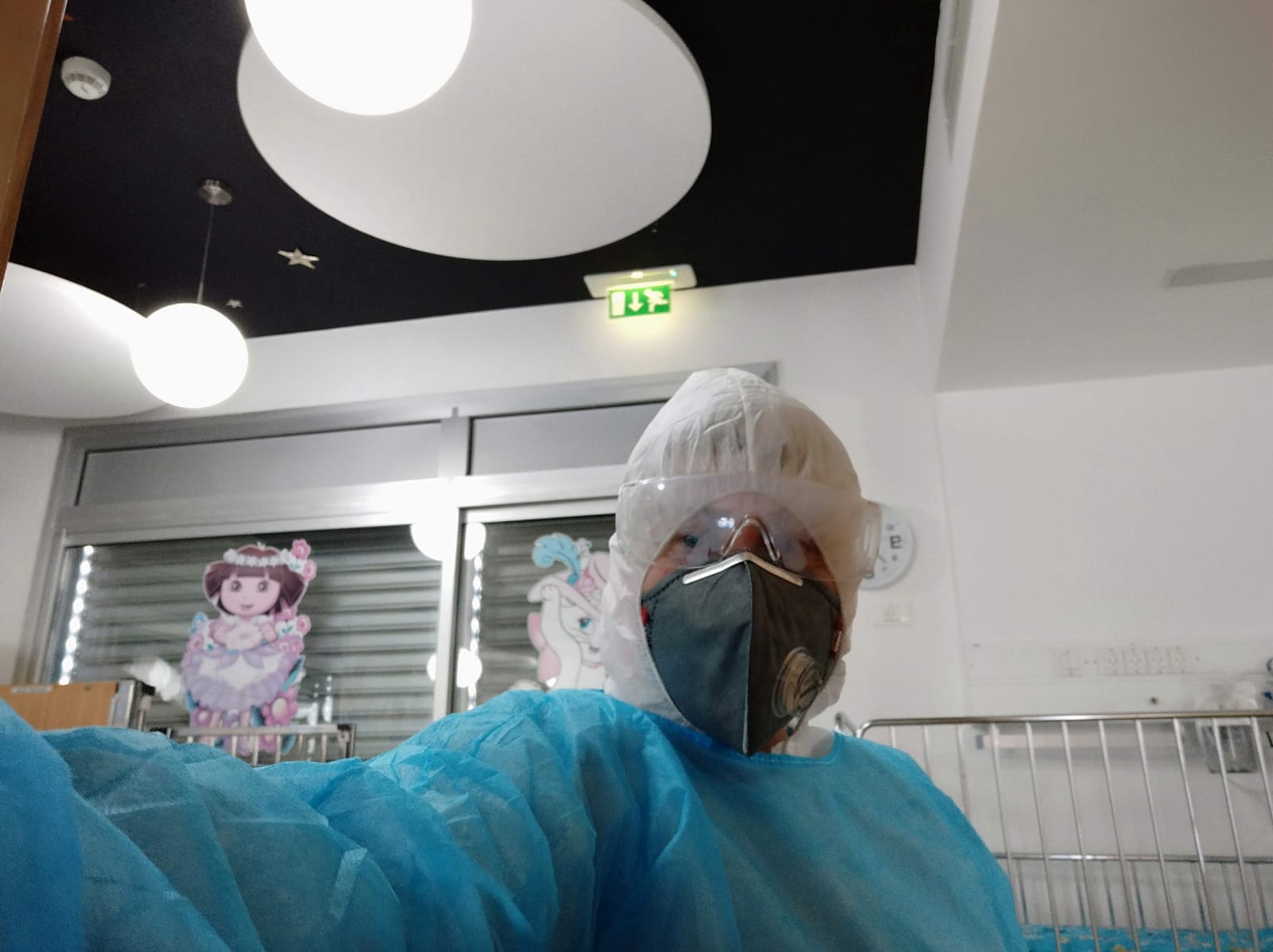Midwife recalls delivering 52 babies in Gaza during military incursion
 In 2004, the community of Beit Hanoun in the Gaza Strip was closed off during a military incursion and pregnant women could not reach hospitals to deliver their babies, until Feeza Shraim and her other volunteer health workers were able to help.
In 2004, the community of Beit Hanoun in the Gaza Strip was closed off during a military incursion and pregnant women could not reach hospitals to deliver their babies, until Feeza Shraim and her other volunteer health workers were able to help.
Feeza is a midwife from Beit Hanoun with 13 children and 30 years’ experience in nursing and midwifery. When the incursion took place she contacted the Ministry of Health and requested help to fit out the local health clinic with the equipment required for delivery and labour. Following this she was able to help women get to and from the clinic from their houses and deliver their babies.
“The work was under very challenging circumstances, sometimes I would get home very late and then I would get a call from one of the women and I would have to go running to her aid. Many cases were delivered amid clashes and bombing. Thankfully I was able to deliver 52 babies with another two volunteers,” said Feeza a Shraim.
WHO celebrated celebrated the work of nurses and midwives on World Health Day on April 7 to remind world leaders of the critical role nurses and midwives play in keeping the world healthy. Healthworkers like Feeza help us live in a happier healthier world and keep our families safe.
“You know the most important thing for me was to help the women deliver with qualified support. The experience of childbirth is a special experience, the mother’s health and her baby’s health was the most important thing for me. It is not easy to have a woman work as a midwife, you have to have experience because the life of the mother and baby depend on you, there is no room for error in this work.”
After this event in 2004, Feeza a was nominated for an award from the Women’s health and dignity, offered by UNFPA and when she received the award she was nominated for an award from an American institute. “I was supposed to travel to New York to receive the award, but I was not granted a visa and could not attend. I received my financial award but the hospital at Beit Hanoun needed medical equipment for the maternity ward so I donated my award to help buy that equipment.”
Feeza has 13 children, eight daughters and five sons and 32 grandchildren, who were all delivered by her. During this COVID-19 outbreak Feeza a and her colleagues are following all safety precautions recommended by local health authorities and they haven’t had many people with COVID-19 symptoms come in. “Those who come are worried to get infected and take the illness to their family. We are still in the first stages in Gaza so we are keeping all precautions as recommended.”
It was very stressful,’ Bethlehem nurse on-call during COVID-19 pandemic
 In early April 2020, 56-year-old paediatric nurse Awatef Handal was called by her employer Caritas Baby Hospital in Bethlehem in the West Bank to assist with a suspected case of COVID-19, a boy from Hebron district. As the on-call nurse was Awatef’s job to stay with the young boy while he had a test taken for COVID-19.
In early April 2020, 56-year-old paediatric nurse Awatef Handal was called by her employer Caritas Baby Hospital in Bethlehem in the West Bank to assist with a suspected case of COVID-19, a boy from Hebron district. As the on-call nurse was Awatef’s job to stay with the young boy while he had a test taken for COVID-19.
“It was very stressful, emotionally and physically…I was worried if the boy would test positive I was worried for myself and worried that if I was exposed to this I would also bring it home and expose my family.
“On the other hand being in the full gear, wearing the personal protective equipment, is also very exhausting. I had to stay in full gear while waiting for the result. It was around eight hours, where you are breathing inside the gear and you start feeling the sweat and the humidity inside.”
Thankfully the boy tested negative and Awatef realized that she had the right personal protective equipment and training to ensure she and her five children and husband were safe during the COVID-19 response.
“When it all began it was very scary that I would go to the hospital and might be exposed and I might bring it back to my family. But now I know that if I take all the precautions and wear the protective equipment properly then I minimize the risk. I got training on the use of the personal protective equipment and how to protect ourselves, and how to make sure that we do not increase the spread. How we put on our protective equipment at the beginning of each shift, determines our fate.”
Awatef has been a nurse for more than 30 years and believes nurses are not properly acknowledged for their work in general and even now with the COVID-19 response the emphasis is on what doctors do you do not hear about the things nurses do even though they do a lot.
 WHO celebrated celebrated the work of nurses and midwives on World Health Day on April 7 to remind world leaders of the critical role nurses and midwives play in keeping the world healthy. Nurses and other health workers like Awatef are at the forefront of COVID-19 response - providing high quality, respectful treatment and care, leading community dialogue to address fears and questions.
WHO celebrated celebrated the work of nurses and midwives on World Health Day on April 7 to remind world leaders of the critical role nurses and midwives play in keeping the world healthy. Nurses and other health workers like Awatef are at the forefront of COVID-19 response - providing high quality, respectful treatment and care, leading community dialogue to address fears and questions.
Despite this, she really appreciates her job: “I love nursing, in the past when I studied nursing, it was challenging and it was not a famous position. People looked at nursing as a job to serve people. I always loved helping others and I look at it as a humanitarian call. Especially children, I feel that I find myself with children for me being a children’s nurse is a very privileged position to be in. Watching a child get better is a wonderful experience and this gives you a feeling of achievement and satisfaction at the end of a long day.”
WHO thanks Austrian Development Cooperation for contribution to COVID19 response
April 9 2020, Jerusalem – The World Health Organization today thanked the Austrian Development Cooperation for its €250,000 contribution to support the WHO’s response to COVID-19 in the occupied Palestinian territory (oPt).
The world is facing an unprecedented challenge with communities and economies everywhere affected by the growing COVID-19 pandemic. In the oPt, a State of Emergency has been effective since March 5.
As of April 7, a total of 261 Palestinians have been confirmed to have COVID-19 in the oPt, 248 in the West Bank and 13 in the Gaza Strip. Of these, one died on 25 March and 42 people have recovered.
Despite the best efforts of local health authorities, the capacity of the Palestinian health system to cope with the expected increase in caseload remains severely impaired by longstanding challenges and critical shortages, particularly in the Gaza Strip.
“We appreciate the quick and generous response by the Austrian Government to provide support and show solidarity at a time when its needed most”, said Dr Gerald Rockenschaub, head of WHO’s office for the occupied Palestinian territory.
“This funding will support WHO and local health authorities to address critical gaps that could undermine the occupied Palestinian territory’s ability to contain and manage the epidemic, including providing the most needed items currently in short supply due to the unprecedented global demand, such as personal protective equipment (PPE) kits and supplies to conduct COVID-19 tests.”
“The spread of COVID-19 puts people living in countries with fragile health care systems especially at risk. It is our responsibility to help make sure that nobody is left behind. We therefore highly welcome WHO’s swift response and are grateful for being able to support the Palestinian authorities in dealing with this unprecedented crisis”, emphasized Astrid Wein, the Austrian Representative in Ramallah.
The funding will strengthen WHO’s efforts in the oPt to combat the COVID-19 pandemic in the oPt and help protect the region’s most vulnerable people from impacts of COVID-19 on already overstretched health systems.
The situation is particularly severe in Gaza, where the health system has been undermined by chronic conflict and blockade, the internal Palestinian political divide, shortages in specialized health staff, drugs and equipment, compounded by electricity cuts impacting hospitals. The strain on Gaza’s health system has been further exacerbated over the past two years due to the high casualty toll from the events surrounding the Great March of Return.
The Austrian Government also released a statement in support of the announcement.
For more information, please contact:
Alice Plate, WHO oPt Communications Specialist,
Katharina Schreiber, Advisor Public Relations, Austrian Development Agency,
Limb Reconstruction Centre launched to assist patients with gunshot injuries in Gaza
5 March 2020, Gaza Strip - Today the World Health Organization in partnership with the Ministry of Health launched a Limb Reconstruction Centre for Gaza Strip, providing hundreds of Palestinians injured with gunshot wounds, with permanent specialized and centralised care.
Based at Nasser Medical Complex in Khan Yunis and generously funded with UK aid, EU humanitarian aid, by the Swiss Agency for Development and Cooperation, the United Nations oPt Humanitarian Fund and the Spanish Agency for International Development Cooperation, the new Centre features a 32-bed ward, two dedicated operating theatres, and 25 specialized multidisciplinary staff (including four orthopedic surgeons, psychologists and physiotherapists).
“The Limb Reconstruction Centre is a new centre of care and excellence, which will provide better quality, faster and more sophisticated treatment and rehabilitation to patients with gunshot injuries sustained during the Great March of Return. It will cater for a wide range of patient needs from wound care, surgery, infection control and physiotherapy to mental health support,” said Dr Gerald Rockenschaub, WHO’s Head of Office for the occupied Palestinian territory.
“This Centre will help transform the lives of those affected by preventing disabilities and amputations, and also restore dignity and hope to those patients who have been left powerless, unable to function and support their families and communities in what is already a difficult environment,” said Mr Jamie McGoldrick, Humanitarian Coordinator for the oPt.
Since the start of the Great March of Return in the Gaza Strip from March 2018 to 31 December 2019, 33,141 injuries and 322 deaths (including 65 children) have been reported. More than 7,951 suffered from gunshot wounds, and 88% of these presented limb wounds.
''The Great March of Return demonstrations in the Gaza Strip, has not only caused tremendous suffering for many families in Gaza but also has placed enormous strain on Gaza’s already under-resourced and over-burdened health care system. Gaza health facilities are facing a critical shortage of essential medicines and supplies, as well as a lack of specialised doctors and nurses. This new Centre will help to address some of these challenges through providing specialised treatment and support for patients requiring limb reconstruction surgery,'' said the EU Representative Sven Kühn von Burgsdorff.
''Today is yet another occasion to recall that the situation in Gaza remains fragile and unpredictable. It is the time to turn the page. Only a political solution can bring fundamental change and put an end to the violence, suffering and hardship,'' he added.
Six hundred patients have already been identified as being in need of limb reconstruction surgery (according to the Ministry of Health as of February 2020) and hundreds more wait to be assessed. Already more than 40 patients have been operated on since the Centre began operation in December 2019.
Gunshot injuries are complicated, expensive and difficult to treat: they can take up to two years to treat per patient; involve four to five surgeries for bone, muscles, soft tissue and nerves; and often involve serious bone infections. Rates of bone infection are extortionately high and an increasing number of patients are showing signs of antibiotic resistance, which increases the chance of amputation and the risk of infection to other patients. A dedicated osteomyelitis (bone infection) treatment centre, built by Médecins Sans Frontières-France in 2020, will be located adjacent to the Limb Reconstruction Centre and complement it.
While there have been medical missions for limb reconstruction in Gaza in the past, there hasn’t been a centralised service which provides permanent and dedicated operating theatres and resources from a multidisciplinary team. This Centre will help coordinate specialized limb reconstruction treatment to rationalize human resources, time, equipment and costs and also establish a patient database to unify information used by all partners deploying emergency medical teams for limb reconstruction services. The Limb Reconstruction Center will also facilitate much-needed training to upskill Gaza’s medical professionals, paving the way for a new generation of trained medical professionals in Gaza. Visiting specialist medical teams will focus their interventions in a centralized structure, maximizing training opportunities for younger resident staff.
Also at Nasser Medical Complex, WHO has installed a CT Scanner, funded by EU humanitarian aid, which will benefit an estimated 11,000 patients per year.
Background information:
The Limb Reconstruction Centre is a vital part of WHOs’ trauma and emergency care programme, which is working with the Ministry of Health (MoH) and partners on an extensive series of interventions that aim to improve the management of traumatic injuries, from the point of injury, at the prehospital level all the way to hospital care, including emergency departments and surgery, to rehabilitation and recovery. With the generous support of donors, since the start of GMR demonstrations in 2018, this programme has helped establish and upgrade 10 Trauma Stabilization Points (TSPs) in critical zones in Gaza with the Palestinian Red Crescent Society (PRCS) and MoH to reduce the burden on the overloaded hospitals substantially. At the TSPs, wounded patients receive life-saving care close to the point of injury and saved on average 1200 lives in a year (from 30 March 2018 to 30 March 2019).
As part of the trauma pathway, in 2020 WHO will:
upgrade six trauma hospitals in Gaza and four in the West Bank to create a trauma response network, providing a range of interventions, from improved infrastructure, provision of supplies, training and clinical coaching for all doctors and nurses working at the emergency departments
build on the success of the TSPs, by expanding them to the Eastern Mediterranean region to respond to conflict related trauma in the region
support the PCRS to centralize all ambulance movements through a new ambulance dispatch centre
provide training for surgeons on acute surgery in the six trauma hospitals to improve damage control surgery through basic principles of control of haemorrhage, prevention of contamination and protection from further injury
provide training to PRCS and MoH staff to provide frontline care in an acute emergency
support the running costs and supplies for the Limb Reconstruction Centre.
The World Health Organization (WHO) is appealing for US$ 20 million over three years to provide life- and limb-saving interventions to large numbers of injured patients and to build on the previous success of the WHO supported interventions and ensure better health outcomes for Palestinians through strengthened continuum of care along the trauma pathway.
For more information, please contact:
Alice Plate, WHO Communications Specialist, occupied Palestinian Territory
+972 54 6153900 |








